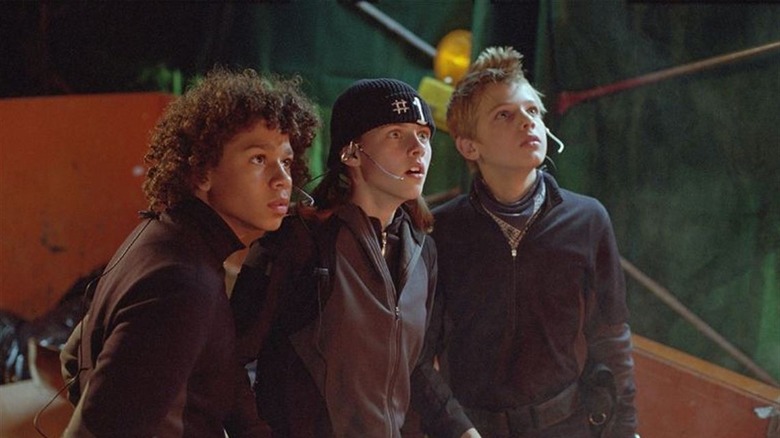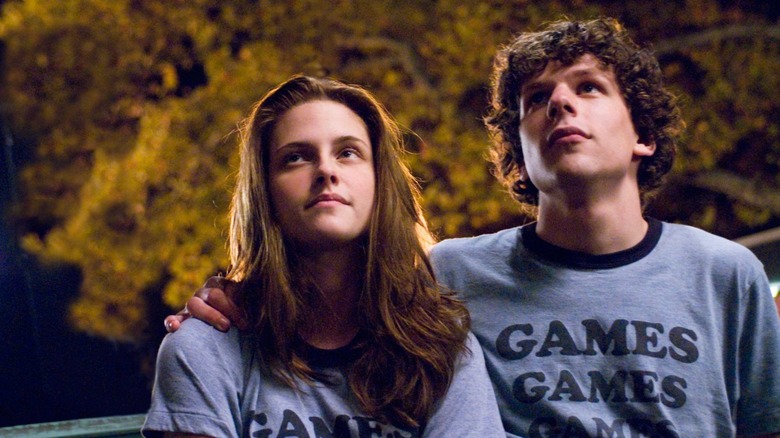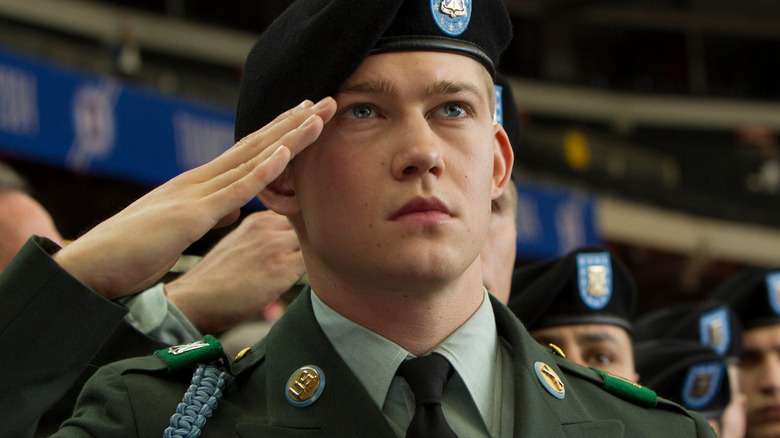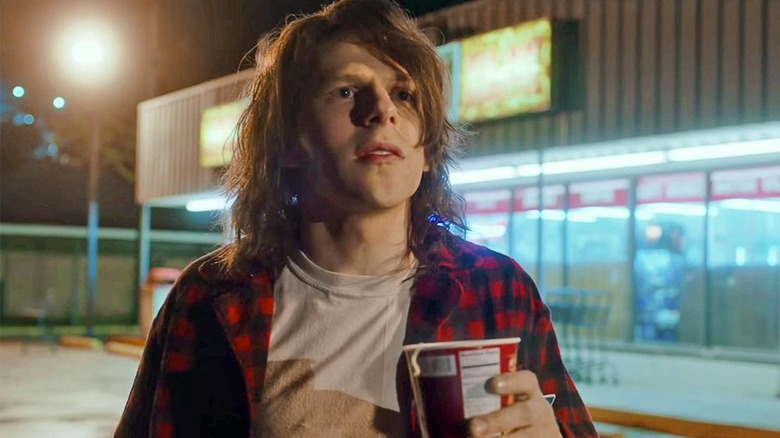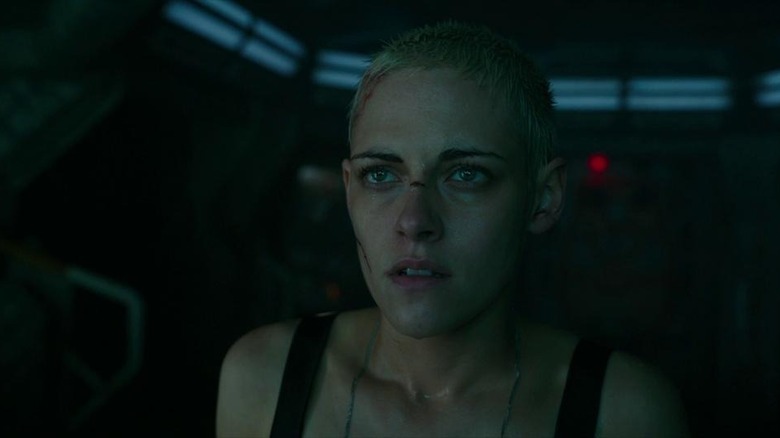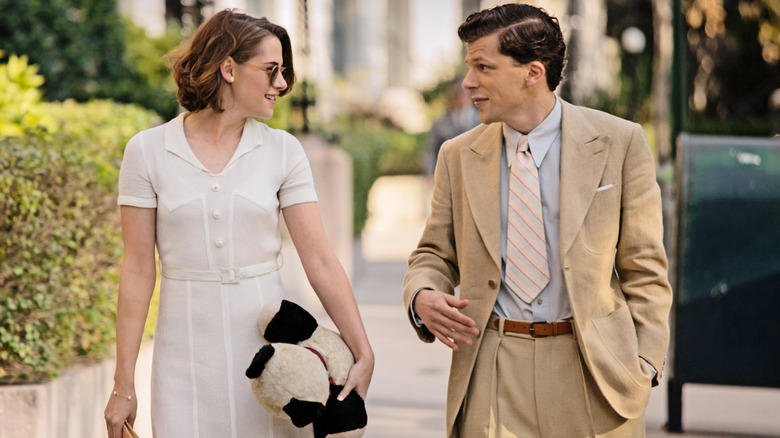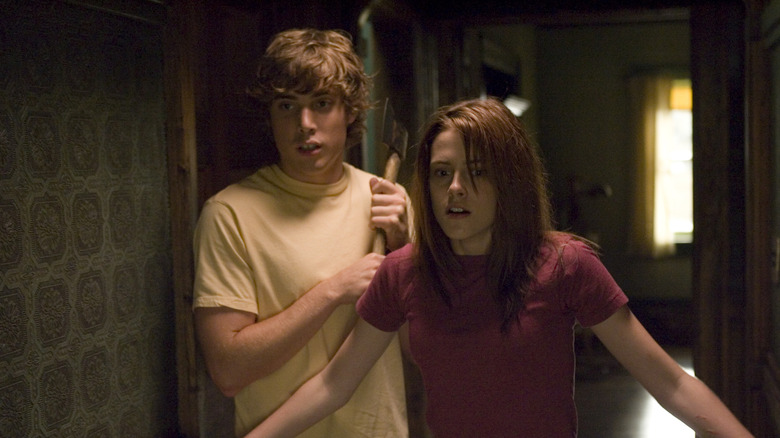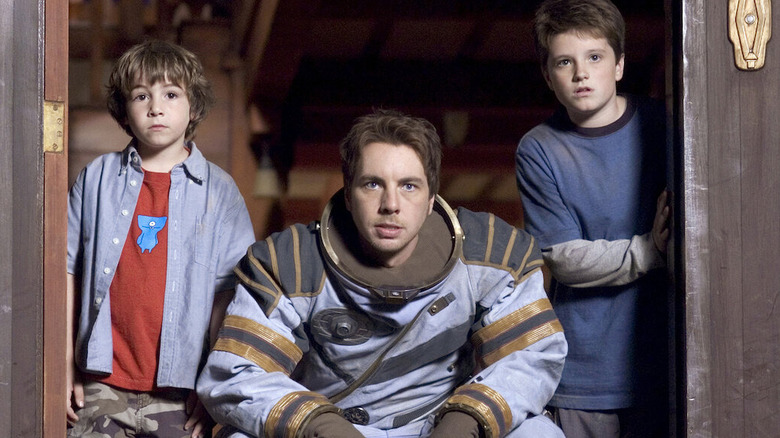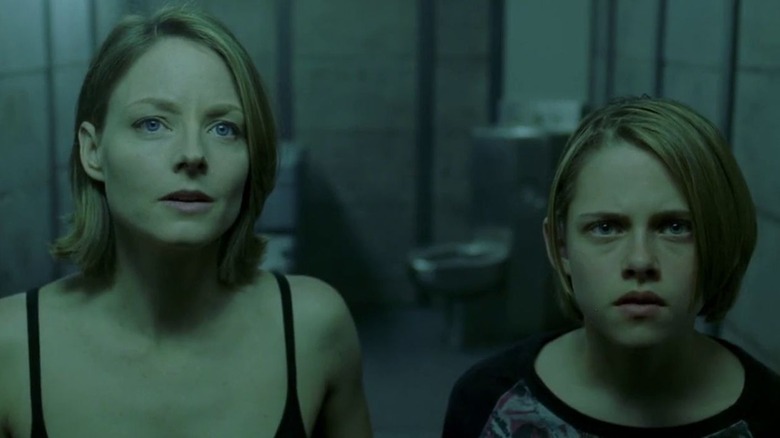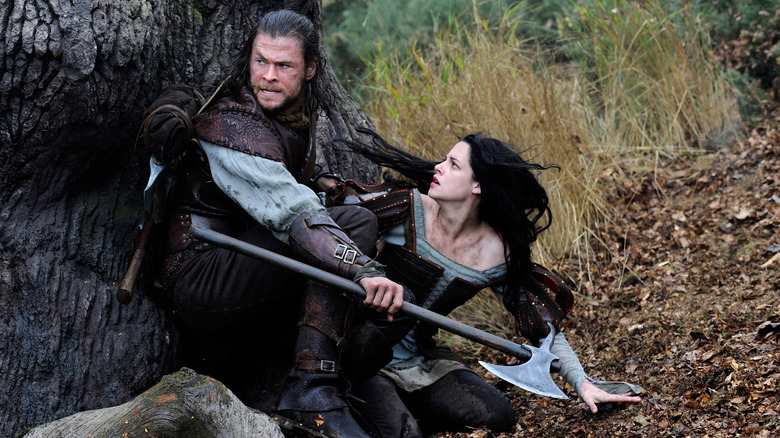Kristen Stewart's Biggest Non-Twilight Movies Ever
It's obvious which series of films serve as the highest-grossing movies in Kristen Stewart's filmography. With a combined worldwide gross of $3.3 billion, the five "Twilight" films loom large over Stewart's career, with each entry in this series managing to surpass the global hauls of all other features she's appeared in. However, just because those "Twilight" entries are unsurpassed moneymakers in her body of work doesn't mean Stewart's filmography is solely defined by "Twilight." On the contrary, after finishing up her duties as Bella Swan, Stewart redefined herself as an arthouse darling by working with acclaimed auteurs, including Pablo Larrain on the acclaimed drama "Spencer."
Stewart's career as a performer also encompasses her pre-"Twilight" days, when she was a child actor appearing in everything from David Fincher thrillers to knock-offs of "Spy Kids." One can truly appreciate the breadth of Stewart's accomplishments as an artist when one breaks down the highest-grossing non-"Twilight" movies she's appeared in. Of course, this collection of motion pictures doesn't feature any box office performers as lucrative as, say, "New Moon," but that's not to say there aren't interesting facts and hit movies to be uncovered in these entries in Kristen Stewart's filmography devoid of sparkling vampires.
Catch That Kid
In the early 2000s, "Spy Kids" inspired a wave of other adolescent-friendly movies about people under the age of 18 engaging in espionage activity. There were the two "Agent Cody Banks" movies, which saw Frankie Muniz doing his best James Bond pastiche, and then, in February 2004, Kristen Stewart tried her hand at the subgenre, "Catch That Kid." This Bart Freundlich directorial effort engaged in the time-old Hollywood plot of a teenage girl using her climbing skills and the aid of two friends to steal a large sum of money. This cash will be used to give her paralyzed dad critical surgery. All super familiar plot points.
One reason "Spy Kids" thrived at the box office was that it was the ultimate fantasy for kids. Ordinary youngsters discovering they can be super-spies that save their parents and the world from danger, that's catnip for moviegoers of a certain age. The knock-offs of "Spy Kids" failed to crack a premise with a similarly compelling hook, and the same goes for "Catch That Kid." This film's marketing failed to present scenarios that could capture the imagination of its target demo. Do kids really imagine themselves just being able to climb well and racing around in go-karts? Those are things you can do in everyday life, not the basis for a hit kids' movie. As a result, "Catch That Kid" could only muster $16.9 million globally.
Adventureland
Kristen Stewart actually filmed "Adventureland" before she was even cast as Bella Swan in "Twilight," let alone before she even filmed her scenes for that blockbuster. However, "Adventureland" distributor Miramax opted to withhold releasing "Adventureland" until after "Twilight" hit theaters. Thus, this coming-of-age comedy, which paired Stewart with Jesse Eisenberg, didn't launch until April 2009.
Despite being Stewart's first movie released after "Twilight" obliterated all box office expectations, "Adventureland" failed to leave much of a box office impact with just $17.5 million worldwide. One of the final Miramax titles distributed by Disney, "Adventureland" was only released in 1,862 theaters domestically, severely limiting its box office potential. Male lead Jesse Eisenberg, meanwhile, hadn't headlined "Zombieland" and "The Social Network" yet, depriving "Adventureland" of another big star to pair Stewart up with. Todd Leopold of CNN also observed how there was an odd discrepancy between how "Adventureland" was marketed and the actual film. Posters and trailers tried to make it look like a lowbrow lewd comedy, potentially to cash in on the audience served by "Adventureland" director Greg Mottola's last movie, "Superbad." However, the project was a much more tender and thoughtful affair than those marketing materials indicated. As a result, "Adventureland" couldn't placate moviegoers looking for crude laughs, and people interested in something more substantive didn't know it was up their alley.
Stewart was a bigger draw after her work on "Twilight," but that wasn't enough to make a sizable difference for the financial prospects of "Adventureland."
Billy Lynn's Long Halftime Walk
During his career as a filmmaker, Ang Lee has managed to take unorthodox concepts and turn them into box office gold, most notably in "Life of Pi." However, even a guy responsible for hits like "Crouching Tiger: Hidden Dragon" can't hit it out of the ballpark financially every time. Case in point: "Billy Lynn's Long Halftime Walk."
This project was always destined to face some struggles at the box office. For one thing, the marketing gave little indication of what the plot of the feature was. It didn't help that much of the pre-release chatter was centered on how the film was meant to be projected in 120 frames per second, a format few, if any, theaters were equipped to show the movie in. Technology that moviegoers wouldn't have access to got precedence over characters or performances in this feature's marketing, a critical flaw that ended up being fatal. Another issue with "Halftime Walk" was mixed reviews from critics, the kiss of death for adult-skewing dramas, especially when movies with consistently strong reviews like "Hacksaw Ridge" and "Arrival" were also around in movie theaters at the time.
While the presence of famous faces, like Kristen Stewart, in the supporting cast was supposed to help provide box office stability, it never came. "Halftime Walk" grossed a terrible $30.23 million globally, nowhere near enough to cover its $40 million budget and a far cry from the biggest movies in Lee's career.
American Ultra
Jesse Eisenberg and Kristen Stewart reunited in 2015 for the comedy "American Ultra," which concerned a stoner who turns out to be a sleeper agent for the U.S. government. Its August 2015 date meant that distributor Lionsgate had hoped "American Ultra" would become the next R-rated comedy to break out big, following in the footsteps of "Tropic Thunder" and "We're the Millers." Those ambitions would, eventually, fail to come to fruition.
In its worldwide box office run, "American Ultra" grossed just $30.2 million, including a disastrous $14.4 million in North America. Part of the problem here was the marketing, including a strange title that didn't immediately suggest this was an action/comedy. Another problem, though, was that neither Eisenberg nor Stewart were consistent box office draws on their own. Leaning an entire film that didn't have the "Zombieland" or "Twilight" brand names attached to it on their names, circa. 2015, just wasn't a great plan. It didn't help that there was lots of action movie competition in the marketplace, including much better-reviewed titles like "Mission: Impossible Rogue Nation." Put all these shortcomings together and it's easy to see why "American Ultra" failed to hit a box office bullseye.
Underwater
For most of her post-"Twilight" career, Kristen Stewart has embraced arthouse fare full of unorthodox filmmaking and unusual ideas. For "Underwater," though, Stewart opted to star in a big-budget movie about a sea of deep-sea employees trying to avoid getting eaten by underwater monsters. It was a creepy departure for Stewart, but unfortunately, it ended up being less successful than some of her more challenging arthouse projects.
In its theatrical run, "Underwater" grossed just $39.1 million globally, a significant disappointment given its $90 million budget. The film was always going to be a challenge to make profitable. Chief among the issues was that this was a costly venture for an oceanic horror movie without any A-list actors or famous source material. Kristen Stewart had only appeared in two non-"Twilight" movies that made more than twice "Underwater's" budget, the box office track record just wasn't there to justify making "Underwater" at this price tag. On top of all that, there were a slew of other horror movies in January 2020 competing for "Underwater's" target demo. No wonder this project sank like a stone at the box office.
Still Alice
When you're a drama with a performance full of Oscar buzz, you're bound to get the attention of moviegoers. Sony Pictures Classics realized this, hence why "Still Alice," and its eventually Oscar-winning Julianne Moore performance, didn't debut in theaters until mid-January 2015. This meant that the project coincided directly with the announcement of the nominations for the 85th Academy Awards. Rather than wait for months for a potential boost from the Oscars, the studio took a big swing and timed "Still Alice's" theatrical release around a hoped Oscar nod.
Luckily, the strategy paid off, since Moore got a Best Actress Academy Awards nomination and was considered the frontrunner for the category. This gave a big boost to its box office run, which eventually amassed $41.5 million worldwide, including $22.9 million from international territories. Made for just $5 million, "Still Alice" was a lucrative venture that also gave Kristen Stewart, who inhabited a critical supporting role in the project, one of her first hit movies after the "Twilight" franchise ran its course.
Cafe Society
With "Cafe Society," writer/director Woody Allen would be changing his tempo a tad. For the first time in over a decade, one of his motion pictures would not be distributed by Sony Pictures Classics. This 2016 film would be the start of a long-term production agreement between Allen and Amazon Studios, a pairing that, in concept, would provide the new studio with plenty of award season-friendly fare. Considering Allen, at the time, had just delivered recent Best Picture Academy Award nominees like "Midnight in Paris" and "Blue Jasmine," it didn't seem out of reach for Allen to supply some buzzy Oscar-friendly projects to the burgeoning film studio.
Though Allen's a famous figure in the history of cinema, not all of his titles are massive hits. For every "Midnight in Paris," there's an "Irrational Man" that sinks without a trace at the box office. Though its $11.1 million domestic sum wasn't massive, "Cafe Society's" $44.3 million worldwide gross made it the sixth-biggest Woody Allen movie in history globally. It also provided Stewart with another $40+ million arthouse global grosser after wrapping up the "Twilight" films, thus providing further evidence that should headline indie fare in addition to movies starring vampires.
The Messengers
Before she was Bella Swan, Kristen Stewart appeared in some interesting titles that served as a precursor to the sort of projects she'd regularly headline as an adult. Then there were the disposable features, the kind of movies any movie star has in their filmography. Among those titles for Stewart was "The Messengers," a critically maligned horror movie dumped into theaters over Super Bowl weekend in 2007 by Sony Pictures/Screen Gems. Even die-hard Kristen Stewart fans would be hard-pressed to remember this project's existence.
Despite its obscurity today, "The Messengers" fared decently at the box office, grossing $53.7 million globally on a $16 million budget. Creepy kids are usually a reliable draw for moviegoers when it comes to horror movies. Thus, the marketing for "The Messengers," which emphasized a young boy who can see a malevolent spirit, always had a leg up when it came to draw in moviegoers. Plus, this project opened over Super Bowl weekend in 2007, where there wasn't much in the way of competition to trip up its box office run. Thanks to minimal opposing titles and other factors, "The Messengers" made some coin for its financiers. Of course, even with that feat accomplished, "The Messengers" is certainly not the kind of project Stewart has further pursued in her post-"Twilight" career.
Zathura
"Jumanji" was a big enough hit in 1995 that it would be understandable to imagine a sequel would eventually arrive sooner or later. However, it took a decade for such a project to emerge in the form of "Zathura." Focusing on entirely new characters, among the main actors on this project was Kristen Stewart, playing the frustrated older sister of the film's two leads. The production was helmed by future "The Mandalorian" creator Jon Favreau, who, circa. 2005, was hot off directing the hit family movie "Elf."
Though "Jumanji" was a big hit, "Zathura" turned out to be a bad roll of the dice at the box office. This sci-fi feature only did $58.5 million worldwide, a meager sum compared to the global gross of its predecessor. Waiting so long to do something adjacent to the world of "Jumanji" certainly didn't help, especially given how, in intervening years, so many family movies had been made in the mold of "Jumanji." However, this one got killed primarily by its release date, which saw "Zathura" opening in the middle of November 2005 in-between "Chicken Little" and "Harry Potter and the Goblet of Fire." Both of those competing family movies grabbed up all the eyeballs that could've gone to the costly "Zathura." It didn't help that there was nobody in the cast that was as big of a draw for family audiences and general moviegoers alike as Robin Williams from "Jumanji."
Charlie's Angels
The first two "Charlie's Angels" theatrical movies made just under $500 million globally combined. Given this track record, it's no surprise Sony/Columbia was eager to eventually give the franchise a rejiggering. In 2019, this opportunity arrived with a new take on the property entitled "Charlie's Angels" from director Elizabeth Banks. This time, Kristen Stewart, Naomi Scott, and Ella Balinska would be inhabiting the role, with the project debuting in the November timeframe that served the 2000 "Charlie's Angels" movie so well.
Unfortunately, this incarnation of "Charlie's Angels" came up short at the box office with just $73.1 million worldwide, which included a disastrous $17.8 million domestically. Part of the problem with this iteration of the property was that there wasn't anything fresh about doing a modern take on "Charlie's Angels" after two preceding movies and an ill-fated ABC reboot from 2015. The lack of distinctive action set pieces or villains in the marketing further hurt this one's box office chances, as was the lack of truly big names in the cast. Whereas the 2000 take on "Charlie's Angels" gathered up a trio of well-known faces, Stewart was the only lead on the 2019 "Angels" that was close to a household name.
At least "Charlie's Angels" cost only $48 million to make, ensuring that the financial losses were minimal. Still, it was doubtlessly disappointing that Stewart and friends couldn't rejuvenate this franchise considering its past success at the box office.
Panic Room
David Fincher is one of those auteurs that makes both critically acclaimed movies and also box office hits that attract moviegoers. This is thanks to Fincher being such an expert at the thriller genre, which has served him well both critically and financially with projects like "Se7en" and "Gone Girl." A further instance of Fincher's gifts in this area could be seen in the 2004 film "Panic Room," which was headlined by Jodie Foster and Kristen Stewart.
Grossing $196.3 million worldwide, "Panic Room" managed to do exactly four times its $48 million budget, making this one an immensely profitable venture for all involved. Jodie Foster's iconic work in "The Silence of the Lambs" means any thriller she headlines will always get the attention of moviegoers. Such attention was enough to propel "Panic Room" to Foster's biggest opening weekend ever. Meanwhile, the simple but effective premise of "Panic Room" was easy to explain in the marketing. Plus, "Panic Room" benefited from good old-fashioned strong word-of-mouth, with domestic moviegoers being so enamored with the film that it managed to top the North American box office for two consecutive weekends. Thanks to these box office achievements, Fincher scored another thriller hit, but he wasn't the only one to reap the benefits of this title. A young Kristen Stewart, who played the project's co-lead, got to headline her first box office hit with "Panic Room." As history has shown, it would be far from the last.
Snow White & The Huntsman
Though pre-release box office forecasts were dubious of its prospects, in June 2012, "Snow White & The Huntsman" benefited financially from perfect timing. The gritty fairy tale trend was still in its infancy since Tim Burton's "Alice in Wonderland" was only two years old at that point. Meanwhile, Kristen Stewart was at the peak of her "Twilight"-inspired fame, while co-lead Chris Hemsworth had starred in the record-breaking box office hit "The Avengers" just one month earlier. On top of all that, "Snow White & The Huntsman" stood out as the rare fantasy movie in a summer 2012 landscape dominated by science-fiction features like "MIB3," "Battleship," and "Prometheus." Plus, it didn't hurt also being a lady-fronted tentpole in a moviegoing season sorely lacking in such fare.
With all these factors in play, "Snow White & The Huntsman" actually became a tidy hit and a signal that both Stewart and Hemsworth could flourish financially outside of their trademark franchises. In its worldwide box office run, "Snow White & The Huntsman" grossed $401 million, making it the 19th biggest movie of 2012 globally. Even better, this blockbuster managed to become one of the 50 biggest live-action fantasy films in history at the worldwide box office. While it wasn't massively profitable thanks to a hefty $170 million budget, being at the right place at the right time at the box office benefited "Snow White & The Huntsman" greatly.

